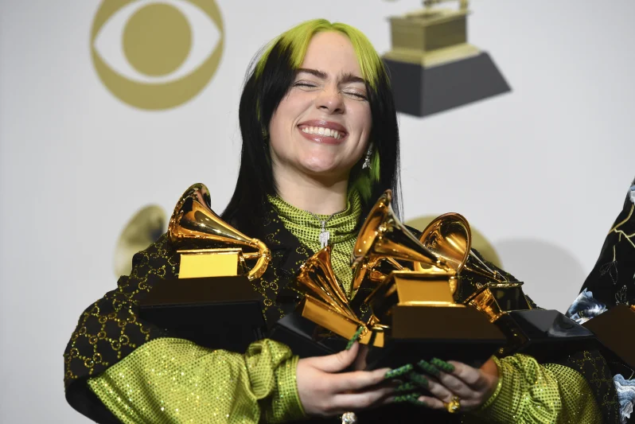The Grammy Awards are undergoing some changes. The Recording Academy announced on Wednesday that they've voted to rename four categories ahead of the 63rd Annual Grammy Awards.
The first of the categories to change is Best Urban Contemporary Album, an award that Lizzo won at this year's ceremony for her album, Cuz I Love You. The category will now be known as Best Progressive R&B Album in an effort to "appropriately categorize and describe this subgenre."
Now the Best Progressive R&B Album award will highlight more "progressive elements" of the genre, which could include elements of hip-hop, rap, dance and electronic music, as well as production elements native to pop, euro-pop, country, rock, folk and alternative music.
Best Rap/Sung Performance has also been renamed, and will thus be known as Best Melodic Rap Performance to "represent the inclusivity of the growing hybrid trends" within the genre. The most recent winner of the award is "Higher," which was performed by DJ Khaled and featured Nipsey Hussle and John Legend.
The category will now focus on honoring solo and collaborative performances that contain elements of rap and melody, rather than modern production. To be recognized in the category, nominees must include elements from other genres including R&B, rock, country, electronic and more.
The Latin Pop Album and Latin Rock, Urban Or Alternative Album categories are also getting an update, and will now be known as Best Latin Pop or Urban Album and Best Latin Rock or Alternative Album, respectively. While the former was most recently awarded to Alejandro Sanz for El Disco and the latter went to Rosalía for El Mal Querer, the new changes have been made in an effort to "migrate the genres of Latin urban and represent the current state and prominent representation in the Latin urban genres."
Both categories will now recognize nominees that use style, structure, lyrics and presentation to reflect "the broad spectrum" of their respective subgenres.
Though it's not being renamed, the Best New Artist award, which most recently went to Billie Eilish, is undergoing a rule change, as there will no longer be "a specified maximum number of releases prohibiting artists" from being nominated. Instead, the screening committees will determine if artists are eligible based on their past successes.
In addition to the change in categories, The Recording Academy also announced that the Nominations Review Committee has a new procedure for addressing potential conflicts of interest.
To that end, after being invited to join the committee, the potential participant will be required to fill out an interest disclosure form, which will reveal potential conflicts of interest they may have for that year's awards. Those conflicts include if the person would be eligible to receive a GRAMMY Award and if they have familial or financial ties to the potential nominees. If a conflict of interest is found to be present after submission of the form, or if one is later discovered, the invitee will be uninvited from participation in the committee for that year. If a potential conflict isn't disclosed, the person will not be allowed to participate in future Nominations Review Committees.
Harvey Mason Jr., Chair & Interim President/CEO of the Recording Academy, expressed excitement about the agreed upon updates to the GRAMMY Awards.
"I'm excited to announce our latest changes, as we're constantly evaluating our Awards process and evolving it to ensure the GRAMMY Awards are inclusive and reflect the current state of the music industry," he said. "The Academy accepts proposals for rule changes from members of the music community throughout the year that are carefully reviewed and, if accepted, ultimately ratified at our annual Board meeting, a process that we are proud to have continued in this challenging year."
"As a peer-driven and peer-voted award, members of the music community are directly involved in the growth and preservation of the GRAMMYs process," added Bill Freimuth, Chief Awards Officer at the Recording Academy. "Each year we receive a number of rule change proposals from artists, producers and songwriters asking us to reevaluate our process to better reflect the current state of the music industry and how it's evolved over the past 12 months."
Latest Stories
-
We’ll cut down imports and boost consumption of local rice and other products – Mahama
57 mins -
Prof Opoku-Agyemang donates to Tamale orphanage to mark her birthday
2 hours -
Don’t call re-painted old schools brand new infrastructure – Prof Opoku-Agyemang tells gov’t
3 hours -
Sunon Asogli plant will be back on stream in a few weeks – ECG
3 hours -
ECOWAS deploys observers for Dec. 7 election
3 hours -
73 officers commissioned into Ghana Armed Forces
3 hours -
Impending shutdown of three power plants won’t happen – ECG MD
3 hours -
Ghana shouldn’t have experienced any ‘dumsor’ after 2017 – IES Boss
4 hours -
Lamens flouted some food safety laws in re-bagging rice – Former FDA Boss Alhaji Hudu Mogtari
4 hours -
Afcon exit: Our issue is administrative failure and mismanagement, not lack of talent – Saddick Adams
5 hours -
WAPCo to commence major pipeline maintenance and inspection from November 25
5 hours -
CEO of Oro Oil Ghana Limited Maxwell Commey listed among the 100 Most Influential People Awards, 2024
5 hours -
Power crisis: Amandi is off due to maintenance, not debt – ECG Boss
5 hours -
Votes cast for late Akua Donkor to be declared invalid – Electoral Commission
6 hours -
You can’t keep “incompetent” Otto Addo for the long term – Countryman Songo
6 hours

